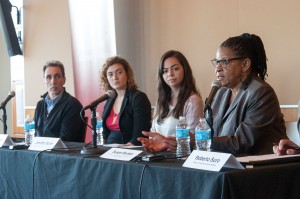Talk Back tackles California prison reform
Several dozen students listened Wednesday to criminal justice experts and activists, including a former prison inmate, discuss the growing rate of incarceration in California and the social and economic costs of the system.
The panel, held in the Ronald Tutor Campus Center Forum, was part of the weekly “Students Talk Back” series, presented in partnership with Dornsife College’s Jesse M. Unruh Institute of Politics, Sol Price’s Tomás Rivera Policy Institute and Sol Price’s Bedrosian Center on Governance and Public Enterprise.

Crime stats · Panelists Emily Reisner, Jennifer Moore and Sarah Burton (right to left) discuss criminal justice reform Wednesday at The Forum. — Priyanka Patel | Daily Trojan
Tomás Rivera Policy Institute director Roberto Suro moderated the panel.
The discussion began with a brief history of crime rates in California, which peaked in the 1990s. JFA Institute President James Austin, noted that despite a subsequent drop in crime, California’s incarceration rate remained high until its peak in the early 2000s.
“It’s a very expensive system and so it’s been very difficult to reform it in any substantial way,” Austin said.
A New Way of Life Reentry Program founder Susan Burton, a former inmate and current reformer of the criminal justice system, criticized the current system’s wasted funds spent on inmates who aren’t given a chance when they show the willingness to better themselves.
“To think that these people are denied release over and over and over again and have thoroughly worked on themselves and cannot walk out those doors is a waste of human potential and a waste of resources — our California resources,” said Burton, also the founder of A New Way of Life Reentry Program, a non-profit organization that provides housing and support for formerly incarcerated women.
As someone witnessed this first-hand, Burton emphasized that the focus needs to be put on those individuals being incarcerated in the first place.
“You need to think, ‘Who are you incarcerating?’” Burton said.
According to a study conducted by Jennifer Moore, a graduate student in public policy and Rivera Policy Institute research assistant, the current California prison system houses inmates at nearly 200 percent capacity. Though California has pledged to lower this number to 137 percent capacity by June 30, this number is not projected to be met in time, meaning more money will continue to flow into the prison system.
Austin cautioned the audience about the repercussions that a costly criminal justice system will have on other areas of interest, including education.
“All you students should be aware of this,” Austin said. “The state prison system is taking money away from the higher education system in California.”
Beyond state spending, the panelists highlighted the repercussions that a broken criminal justice system can have on individuals once out of prison, namely the lack of jobs and community respect.
Emily Reisner, a graduate student in public policy who is also a research assistant for the Rivera Policy Institute, said the system fails to encourage rehabilitation into society.
“It’s not only the rap sheet, it’s the stigma around the population that needs to be approached,” Reisner said.
